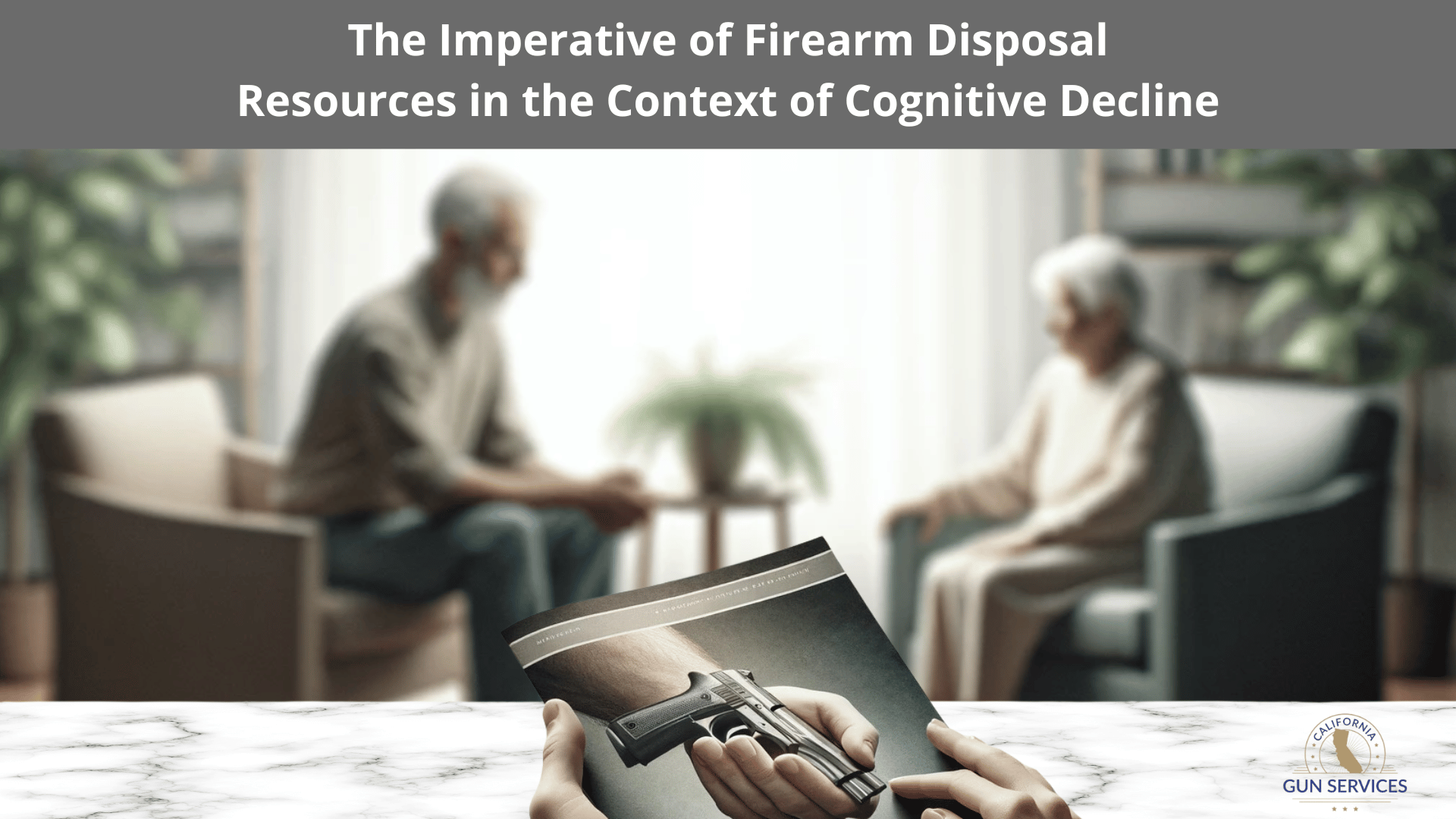We at California Gun Services recently teamed up with the Alzheimer's Association of Orange County to educate families, particularly those affected by ALzheimer's Disease and Related Dementia (ADRD), about firearm safety. Our goal with our firearm disposal resource is to offer information and resources for families dealing with the challenges of dementia and guns in the house.
In families where a loved one suffers from cognitive decline, the dynamics of care and safety undergo a profound transformation. Cognitive impairments, such as those seen in Alzheimer’s or other forms of dementia, not only affect the individual’s memory and judgment but also raise critical safety concerns, particularly regarding firearms in the home. This essay delves into the myriad benefits of having a dedicated resource for firearm disposal for families and caregivers of individuals with cognitive decline.
1. Ensuring Safety and Preventing Tragedy
Firstly, safety is the primary concern. Certainly, the most immediate and compelling benefit of a firearm disposal resource is the enhancement of safety. As cognitive abilities wane, the risk of accidental discharge or misuse of firearms increases dramatically. Indeed, cognitive decline can lead to unpredictable behavior, impaired judgment, and a diminished capacity to understand the risks associated with handling firearms. The presence of guns in households with cognitively impaired individuals drastically increases the risk of accidental shootings or self-harm. This risk is not limited to the individual with cognitive decline. Undoubtedly, it extends to family members, caregivers, and even the community at large. A disposal resource effectively mitigates these risks by ensuring the removal of firearms from potentially dangerous situations.
2. Legal Compliance and Liability Reduction
With cognitive decline, the legal implications of firearm ownership come to the forefront. In many jurisdictions, there are laws governing the possession of firearms by individuals who are deemed unfit to handle them due to mental impairments. Failure to comply with these laws can result in legal repercussions for the individual and their family. A firearm disposal resource ensures compliance with these legal requirements. This protects the individual from potential legal complications. Moreover, it assists families in navigating these legal complexities, thus shielding them from potential legal liabilities.
3. Psychological Relief for Families and Caregivers
Families and caregivers of those with cognitive decline often grapple with constant worry and stress. Certainly, the mental burden of worrying about the presence of firearms can add unnecessary stress to an already challenging situation. Conversely, having a disposal resource alleviates this anxiety. Such resources provides peace of mind to family members. Knowing that firearms have been safely removed from the home alleviates the worry associated with potential accidents or misuse. This allows families to focus more on the care and comfort of their loved one, rather than the fear of a firearm-related accident.
4. Facilitating Difficult Conversations and Decisions
Discussing the removal of firearms can be a sensitive and challenging conversation. Disposing of a firearm, especially one that may hold sentimental value or be tied to family history, can be an emotionally charged decision. A specialized disposal resource can provide the necessary support and guidance to families during this difficult time, ensuring the process is handled with sensitivity and respect.
5. Educational and Awareness-Raising Function
The presence of a dedicated resource for firearm disposal provides educational opportunities. Notably, it often plays a vital role in educating families about the risks associated with firearms and cognitive decline. This education includes information on safe storage practices, legal responsibilities, and the importance of early intervention in firearm removal. It also assists families with understanding the legal aspects of firearm ownership under these circumstances. This education is crucial in helping families make informed decisions about firearm safety in the context of cognitive decline. Further, increased awareness can lead to proactive measures, ensuring safety before incidents occur.
6. Supporting Public Health and Community Safety
The benefits of firearm disposal resources extend beyond individual households to the broader community. By reducing the number of firearms in homes with cognitively impaired individuals, these resources contribute to public safety. Chiefly, this is acheived by decreasing the likelihood of firearm-related accidents or incidents within the community.
7. Respectful Handling of Sensitive Situations
Firearm disposal, particularly in the context of cognitive decline, is a sensitive issue. A professional disposal resource ensures that the process is handled with dignity, acknowledging the emotional significance of firearms to their owners and their families. This respectful approach is crucial in providing a compassionate and understanding service.
8. Creating a Culture of Responsibility
Such resources play a critical role in fostering a culture of responsibility around firearm ownership, particularly in the context of cognitive health. They emphasize the importance of responsible gun ownership, which includes recognizing when it is no longer safe for individuals to have access to firearms. As cognitive decline becomes an increasingly prevalent issue in our aging society, the availability of such resources becomes not just a benefit but a necessity for the well-being and safety of families and communities.
9. Providing a Comprehensive Solution
Finally, a firearm disposal resource offers a holistic solution to a complex problem. It not only addresses the immediate safety concerns but also provides support, education, and legal guidance, thereby offering a comprehensive approach to the issue of firearms and cognitive decline.
Conclusion
In conclusion, the availability of a dedicated firearm disposal resource offers numerous benefits to families and caregivers of individuals with cognitive decline. It ensures safety, aids in legal compliance, provides psychological relief, facilitates difficult conversations, educates families, supports community safety, handles sensitive situations respectfully, promotes a culture of responsibility, and offers a comprehensive solution to a challenging issue. As our population ages and the prevalence of cognitive impairments increases, such resources become indispensable in safeguarding the well-being of families and communities alike.


